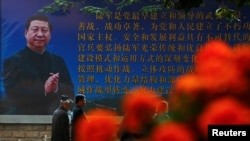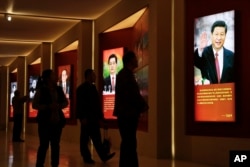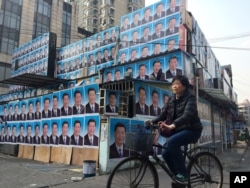China's communist party has wrapped up high-level political meetings in Beijing, bestowing the prestigious title of core of the party on the country's increasingly powerful leader, Xi Jinping.
The title and status could help Xi better lead the party, enforce discipline, and give him more control over the selection of a new slate of top leaders late next year, analysts said. What is less clear is how the title will help China with the wide range of challenges it faces from a slowing economy, rising debt and stagnating market reforms.
Loyal to core
Some believe that problems such as slowing private investment, ballooning debt and a lack of progress in forwarding the reform of state-owned enterprises are issues of party cadre loyalty. Therefore, the logic goes, making Xi the core of the party and tightening discipline means party members have no choice but to get in line or face the consequences.
Jude Blanchette, a Beijing-based researcher who is writing a book on the legacy of former Chinese leader Mao Zedong, says "that could certainly help at the margins, with cadres following orders, if that is what you thought the problem was."
"However, I think a different interpretation is, it really isn't a problem of discipline within the party — although that might matter to some extent. Really, what the problem is: Are policies coming down from the center, clear, coherent and non-contradictory?"
Blanchette notes that at a time when the world's second-largest economy is slowing, local leaders are receiving an array of key performance indicators that range from maintaining moderate growth and social and financial stability, to implementing structural reforms and taking into consideration environmentally responsible Gross Domestic Product targets.
No excuses now
Hu Xingdou, an economist at the Beijing Institute of Technology, says that while it may have previously been difficult to blame Xi Jinping directly for a host of problems that China faces, that will no longer be the case as he takes on the mantle of core of the party.
"As he becomes core of the party, Xi should have the capability and authority to correct the illegal actions that have been taken, in particular by the government and officials, and to carry out the pledges that were made during the party's third and fourth plenums," Hu said.
This week's meeting, the sixth plenum, has focused on party discipline. The third and fourth plenums made pledges to give the market more sway in the economy, reform the country's bloated State Owned Enterprises and promote the rule of law. Many of those pledges have yet to be realized and, in some cases, officials have moved in the opposite direction.
There is a concern that China is isolating itself from the world as it tightens controls on everything from foreign investment to online speech and the running of non-governmental organizations.
"He [Xi] should try to reverse the trend, in which China has been moving backward toward the times of the Cultural Revolution and Mao Zedong era,” Hu said. “It is a trend that isolates China in seclusion."
Succession questions
By giving Xi the title of core, there is also concern that China's leader could be amassing too much power and that unlike leaders in the past, his time in office could last longer than the usual two terms.
Blanchette says that granting Xi the title clearly "muddies the water" about where the power succession is headed, but is not a silver bullet when it comes to figuring on whether norms on leadership retirement or term limits will change.
"Certainly if you were the prosecution making the case that Xi Jinping is likely to stay on for a third term, this would certainly be a piece of evidence that you will enter and enter in [to your case]," he said.
Xi is the fourth leader to receive the title since the Chinese Communist Party began single-handedly ruling China in 1949.
Hu Xingdou says that even with his title, Xi should still honor the party's traditions of collective decision making.
"When it comes to the decision-making of major policies, members of Politburo and standing committee should be consulted. That means that Xi cannot be the only 'final sayer' to hammer out all the country's economic policies," Hu said.
Sensitive to such concerns, party officials and state media have been talking about the continuing importance of collective leadership as well as widespread support for Xi.
Party officials say the bestowing of the title on Xi is a natural outgrowth of his popularity both within the party and among the Chinese public.
At a news conference Friday to outline changes that were approved during the meeting, party officials specifically noted that the decision to elevate Xi to the status of core came with the approval of all of those in the military and local governments.
Officials also said that all of the public agrees with the decision. China does not conduct public approval surveys for its leaders, nor are they elected by popular vote.









